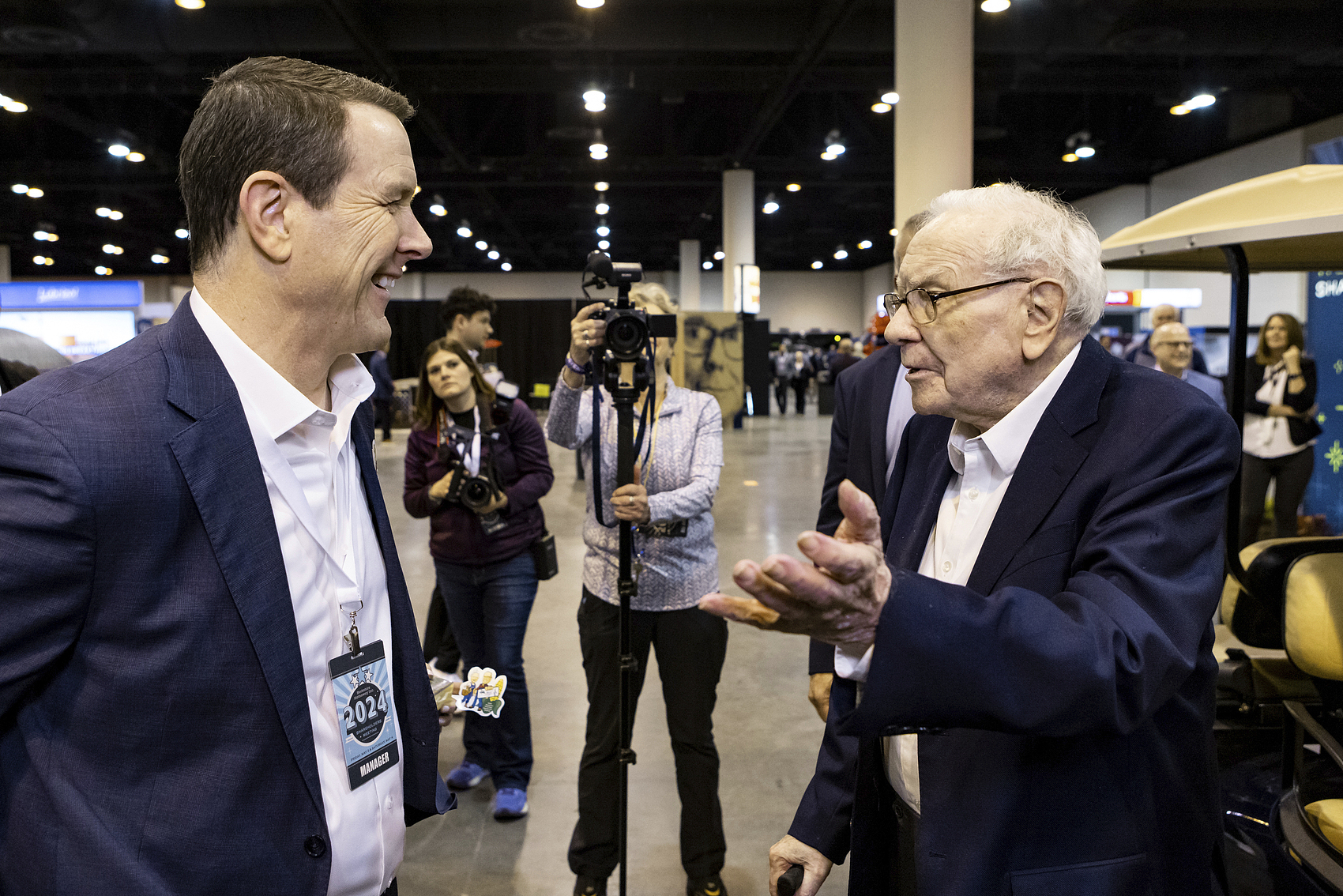Warren Buffett's 5 Investing Mistakes: What Can We Learn?
Warren Buffett's 5 Investing Mistakes: What Can We Learn?
Warren Buffett, widely regarded as one of the most successful investors ever, has built a massive fortune through smart investments and a sharp sense for spotting value. However, even the Oracle of Omaha is not immune to making mistakes. In fact, Buffett himself is candid about his investment blunders and considers them valuable learning experiences. Here, we explore 5 of Buffett’s biggest investing mistakes and the lessons they impart.
沃伦·巴菲特被普遍认为是有史以来最成功的投资者之一,通过聪明的投资和敏锐的价值发现能力积累了一大笔财富。然而,即使是奥马哈神谕也无法免于犯错。事实上,巴菲特本人坦率地谈论过他的投资错误,并认为它们是宝贵的学习经验。在这里,我们探讨了巴菲特5个最大的投资错误以及它们带来的教训。
1. Dexter Shoe Company
1. 德克斯特鞋业
In 1993, Warren Buffett’s Berkshire Hathaway acquired Dexter Shoe Company for approximately $433 million. Buffett paid for the acquisition with Berkshire Hathaway stock, which, in hindsight, was a costly error. Dexter Shoe, which was initially profitable, soon faced significant challenges due to increased competition from low-cost overseas manufacturers. The company's decline was swift, and it eventually became worthless. Buffett later admitted that the decision to purchase Dexter Shoe with stock was one of his worst mistakes, costing Berkshire shareholders billions as the value of those shares skyrocketed over time.
1993年,沃伦·巴菲特的伯克希尔·哈撒韦以约43300万美元收购了德克斯特鞋业。巴菲特用伯克希尔·哈撒韦的股票支付了收购款,事后证明这是一个代价高昂的错误。德克斯特鞋业最初是盈利的,但很快面临了来自低成本境外制造商的激烈竞争。公司的衰落迅速,最终一文不值。巴菲特后来承认,用股票购买德克斯特鞋业是他犯下的最严重错误之一,因为这些股票的价值随着时间的推移飙升,导致伯克希尔的股东损失数十亿美元。
Lesson Learned: The Dexter Shoe failure taught Buffett the importance of assessing the durability of a company's competitive advantage. It also highlighted the potential opportunity cost of using valuable stock as a currency for acquisitions. Investors should be cautious when evaluating companies vulnerable to industry shifts and competitive pressures.
教训:德克斯特鞋业的失败教会巴菲特评估公司竞争优势的持久性的重要性。它还凸显了将宝贵股票用作收购货币的潜在机会成本。投资者在评估容易受行业转变和竞争压力影响的公司时应谨慎。
2. Tesco PLC
2. 英国乐购超市
Buffett’s investment in Tesco, a British grocery chain, is another example of a misstep. Berkshire Hathaway began purchasing Tesco shares in 2006 and eventually became one of the company's largest shareholders. Initially, the investment appeared promising, but Tesco soon faced accounting scandals and operational difficulties. Buffett was slow to react to the negative developments and began selling his shares only after the problems became too significant to ignore, resulting in an estimated loss of over $400 million.
巴菲特对英国乐购超市的投资是另一个错误的例子。伯克希尔·哈撒韦从2006年开始购买乐购股票,最终成为该公司最大的股东之一。最初,这项投资似乎很有前景,但乐购很快面临会计丑闻和运营困难。巴菲特对负面事件反应迟缓,直到问题变得太严重无法忽视时才开始出售股票,结果估计损失超过40000万美元。
Lesson Learned: The Tesco experience underscores the importance of vigilance and timely decision-making. Investors must stay informed about their holdings and be ready to act decisively when a company's fundamentals deteriorate. It serves as a reminder that even well-established companies are not immune to mismanagement and scandal.
教训:乐购的经历强调了警惕和及时决策的重要性。投资者必须及时了解自己持有的股票情况,并在公司基本面恶化时做好果断的准备。它提醒我们,即使是历史悠久的公司也不会免于管理不善和丑闻。

3. US Airways
3. 美国航空公司
In the late 1980s, Buffett invested in US Airways, attracted by the airline's potential for turnaround and profitability. However, the airline industry proved to be highly volatile and fraught with challenges, including labor disputes and fluctuating fuel prices. US Airways struggled financially, and Buffett later described the industry as a "death trap" for investors. Although Berkshire eventually made a small profit when the airline recovered, the investment was fraught with uncertainty and risk.
上世纪80年代末,巴菲特投资了美国航空公司,被该航空公司的扭转潜力和盈利潜能所吸引。然而,航空业被证明是充满挑战的,包括劳资纠纷和燃油价格波动。美国航空公司陷入财务困境,巴菲特后来将该行业描述为对投资者来说是一个"死亡陷阱"。尽管伯克希尔最终在航空公司复苏时获得了一点利润,但这项投资充满了不确定性和风险。
Lesson Learned: Buffett's US Airways investment highlights the perils of investing in industries plagued by structural issues and high levels of unpredictability. It taught him the importance of understanding industry dynamics and the risks associated with businesses that require significant capital expenditure and are sensitive to external factors. As a result, Buffett has generally avoided airline investments, although he made a notable exception in the 2010s, which he later exited.
教训:巴菲特在美国航空公司的投资突显了在受结构性问题和高度不可预测性困扰的行业中投资的风险。这使他认识到了理解行业动态和考虑那些需要大量资本支出且对外部因素敏感的企业的风险的重要性。因此,巴菲特一般避免航空业投资,尽管他在2010年代做了一个引人注目的例外,后来又退出了。
4. ConocoPhillips
4. 康菲石油
In 2008, Buffett made a significant investment in ConocoPhillips as oil prices were soaring. However, he misjudged the cyclical nature of the energy market. Soon after his investment, oil prices plummeted during the financial crisis, leading to substantial losses for Berkshire Hathaway.
2008年,巴菲特在康菲石油进行了重大投资,当时油价飙升。然而,他错误地判断了能源市场的周期特性。投资后不久,金融危机期间油价暴跌,给伯克希尔·哈撒韦造成了重大损失。
Lesson Learned: This experience highlights the risks of investing based on commodity price speculation. For investors, it emphasizes the necessity of timing and market conditions when considering investments in cyclical industries. Diversification and a margin of safety are crucial.
教训:这一经历突显了基于商品价格猜测进行投资的风险。对于投资者,它强调了在考虑对周期性行业的投资时,考虑时机和市场情况的必要性。分散投资和安全边际至关重要。
5. IBM
5. IBM
In 2011, Buffett made headlines when he invested heavily in IBM, a departure from his usual avoidance of technology stocks due to their rapid changes and uncertainties. Buffett believed IBM had a solid business model and significant growth prospects. However, the company struggled to adapt to the changing tech landscape, facing declining revenues and increasing competition. By 2018, Buffett had significantly reduced his stake in IBM, acknowledging that his original thesis had not played out as expected.
2011 年,巴菲特引起轰动,当时他大举投资 IBM,这与他通常避开技术股的做法相去甚远,因为技术股变化迅速且充满不确定性。巴菲特相信 IBM 拥有稳健的业务模式和巨大的增长前景。然而,该公司在适应不断变化的科技格局方面遇到了困难,面临营收下降和竞争加剧。到 2018 年,巴菲特已大幅减持 IBM 股份,承认自己最初的投资论点并未如预期那样发挥作用。
Lesson Learned: The IBM investment serves as a reminder of the complexities and rapid evolution within the technology sector. Buffett's experience emphasizes the need for thorough understanding and caution when investing in industries outside one's expertise. For investors, sticking to areas where they have a strong knowledge base can help mitigate risks associated with unfamiliar sectors.
得到的教训:IBM 投资提醒人们科技行业内部的复杂性和快速演变。巴菲特的经历强调了在投资自己不熟悉的行业时,需要深入了解和谨慎行事。对于投资者来说,坚守自己拥有坚实知识基础的领域可以帮助降低涉足不熟悉领域的风险。
Conclusion
结论
The key takeaway from Buffett's experiences is the importance of continuous learning and adaptability. By acknowledging and analyzing past missteps, investors can refine their strategies and improve decision-making processes. Emphasizing the significance of understanding competitive advantages, industry dynamics, and company fundamentals, Buffett's journey underscores the value of patience, discipline, and a long-term perspective in the world of investing. As we navigate our own investment paths, let us remember Buffett's wisdom and strive for informed, thoughtful, and resilient investment practices.
巴菲特经历的关键收获在于持续学习和适应能力的重要性。通过承认和分析过去的失误,投资者可以优化策略并改进决策流程。强调理解竞争优势、行业动态和公司基本面的重要性,巴菲特的经历强调了在投资世界中耐心、纪律和长期视角的价值。在我们探索自己的投资道路时,让我们牢记巴菲特的智慧,努力进行审慎、深思熟虑且具有韧性的投资实践。


 Buffett’s investment in Tesco, a British grocery chain, is another example of a misstep. Berkshire Hathaway began purchasing Tesco shares in 2006 and eventually became one of the company's largest shareholders. Initially, the investment appeared promising, but Tesco soon faced accounting scandals and operational difficulties. Buffett was slow to react to the negative developments and began selling his shares only after the problems became too significant to ignore, resulting in an estimated loss of over $400 million.
Buffett’s investment in Tesco, a British grocery chain, is another example of a misstep. Berkshire Hathaway began purchasing Tesco shares in 2006 and eventually became one of the company's largest shareholders. Initially, the investment appeared promising, but Tesco soon faced accounting scandals and operational difficulties. Buffett was slow to react to the negative developments and began selling his shares only after the problems became too significant to ignore, resulting in an estimated loss of over $400 million.